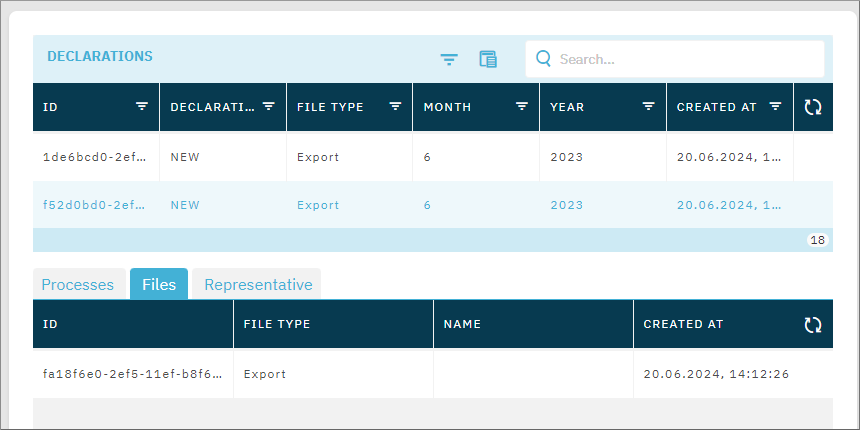Intrastat UI
From the Intrastat page of the SBS portal, you can perform the following actions:
- View all Intrastat declarations for the currently selected account, application, and tenant
- For each declaration, you can view its processes, input files, and representative details
- Filter, search and sort Intrastat declarations.
Access
You can access the Intrastat page of the portal as follows:
- Sign in to the SBS Portal. During the sign-in process, you will be prompted to select the account, app, and tenant where you are entitled to sign in.
- Click RO Intrastat in the left hand-side menu.
- If applicable, select the organization from the drop-down list at the top of the page.
To interact with the Intrastat service, you can use either the Web UI or a GraphQL interface. You can switch at any time between the two interfaces by clicking the switch displayed at the top of the page:

View Intrastat declarations
After you access the Intrastat Declarations UI, the declarations stored in SBS for the selected account, application, and tenant are displayed in the upper grid. To view details about a particular declaration, click the respective row in the grid. This loads all processes, files and representative details of that declaration in the lower grid, for example:

Intrastat declaration structure
The table below shows the declaration fields that are exposed through the Web UI.
| Field | Description |
|---|---|
| ID | The unique identifier of the Intrastat declaration in SBS. |
| Declaration type | Specifies the type of the declaration. Valid values: NEW, REVISED, NILL. |
| File type | Specifies whether the declaration is an import or an export kind. Valid values: Import, Export. |
| Month | The month of the reporting period. |
| Year | The year of the reporting period. |
| Created at | The date and time when the declaration was created. |
Process structure
A declaration may have multiple processes. A new process is created every time the declaration is computed (through a call to generateDeclaration mutation). A declaration’s process has the following structure:
| Field | Description |
|---|---|
| ID | The unique identifier of the process in SBS. |
| Status | The status of the declaration. Valid values: INPROCESS - computation is in progress, DONE - computation has completed without errors, ERROR - computation has completed with errors. |
| Errors | This fields reports errors that occurred during processing, if applicable. |
| Created at | The date and time when the process was created. |
| Click the icon to download the declaration’s result file to the local disk. |
File structure
A declaration may have multiple input files. An Intrastat declaration’s file has the following structure:
| Field | Description |
|---|---|
| ID | The unique identifier of the file in SBS. |
| File type | The type of data reported by the file. Valid values: Import, Export. |
| Name | The file name. |
| Created at | The date and time when the file was created. |
Representative structure
A declaration has one representative (that is, the legal person who submits the declaration). A declaration’s representative has the following structure:
| Field | Description |
|---|---|
| ID | The unique identifier of the representative in SBS. |
| First name | The representative’s first name. |
| Last name | The representative’s last name. |
| Phone | The representative’s phone. |
| The representative’s email address. |
Filter, search, and sort Intrastat declarations
To filter declarations by the values displayed in the grid, click the Filter  icon on the respective column header in the grid. The colour of the Filter icon on each column header denotes whether the filter is active:
icon on the respective column header in the grid. The colour of the Filter icon on each column header denotes whether the filter is active:
| Icon | Meaning |
|---|---|
 |
Filter is not active |
 |
Filter is active |
To search Intrastat declarations, type your search text in the Search text box available in the right-upper corner of the grid. You can use any field as search term (for example, the declaration ID).
To sort declarations, click the respective column of the grid. The arrow indicates the current sorting order.
Query Intrastat declarations through GraphQL
To query Intrastat declarations through GraphQL:
- Switch to the GraphQL interface.
- Run the
declarationsquery of the Intrastat Declaration Service, for example:
query declarations ($filter:DeclarationsFilter!) {
declarations(filter:$filter) {
id
organization { id name tin regNo }
representative { firstName lastName email phone }
declarationType
fileType
month
year
files { id declarationId fileType name uploadUrl createdAt }
processes { id status errorMessages result { id name createdAt downloadUrl } }
createdAt
}
}
{
"filter": {
"organizationId": "YOUR_ORGANIZATION_ID"
}
}
Create, generate, delete declarations
You can create, generate, and delete declarations only from the GraphQL interface. For details, see the API reference to the Intrastat Declarations Service.